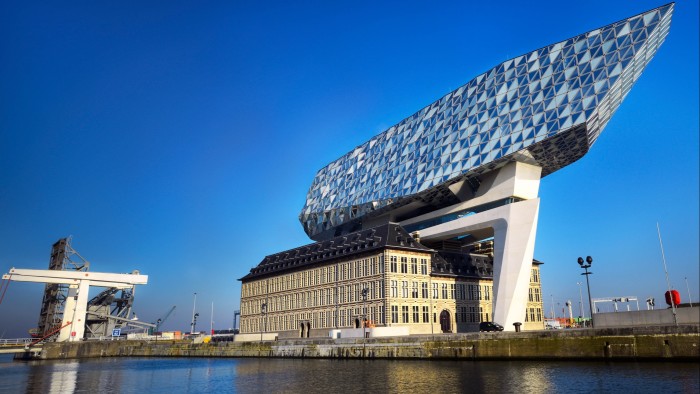‘Resilience’ of Belgian economy supports local start-ups

Simply sign up to the European companies myFT Digest -- delivered directly to your inbox.
Belgium’s economy is now among the fastest growing in the eurozone — and its young businesses appear to be benefiting.
The country, which sits in the centre of an arc of EU prosperity from southern Sweden through Paris to northern Italy, is among the ten most represented nations in the FT’s ranking of Europe’s fastest-growing companies — for the very first time.
Belgium has 15 businesses in the FT 1000 list which, when added to the Netherlands’ 29, highlight the role of Benelux countries in such sectors as fintech, smart logistics, and advanced manufacturing.
Economists at Belgian bank KBC emphasise the country’s economic strength. Its real GDP growth in the final quarter of 2023 was 0.4 per cent, quarter on quarter — double their forecast. “The positive surprise illustrates the continued resilience of the Belgian economy,” the economists wrote last month. And full-year GDP growth of 1.5 per cent was triple that of the eurozone.
“Remarkably, Belgium is one of the few European countries that did not record a single negative quarterly growth rate since the beginning of 2022,” the KBC economists added. “Economic activity in Belgium at the end of 2023 was 5.5 per cent above its pre-pandemic level, compared with only 3 per cent in the euro area.”
The main driver has been the Dutch-speaking region of Flanders. It has top universities, liveable cities such as Ghent and Leuven, an open economy served by Europe’s second-largest port by volume, Antwerp-Bruges, and many English speakers.
Unlike the French-speaking southern region of Wallonia, Flanders has little legacy of heavy industry, such as coal mining and steelmaking. It tends to host companies in high-margin industries and has a leading position in agricultural science.
As Belgium is a federal state, Flanders has its own government, too, which controls more than half of state spending. Almost 60 per cent of the country’s 11.7mn population live in the state, with another 11 per cent in Brussels, which is located in Flanders but classed as a separate region.
Flanders’s economy is supported by a dedicated resilience plan, which aims to keep it competitive, and includes financial and administrative help for start-ups. Bodies such as Flanders Investment & Trade (FIT), a promotion agency, provide grants, export advice and introductions to potential investors and customers.
“We encourage building large ecosystems for our companies, especially in research and development,” says Desna Lespinoy, spokesperson for FIT. “At least 3.2 per cent of our GDP is allocated to it. Flanders takes pole position in Europe on research and development. We surpass the EU average (2.1 per cent) and other frontrunners, such as the Netherlands and Denmark.”
The fastest-growing sectors include life sciences, automotive, and media and entertainment, she reports. For example, one of the Belgian companies in this year’s FT 1000 is Maxflow, which owns Crazy Games — a developer of browser-based games with more than 20mn monthly users. It partners with independent designers and earns revenue from advertising.

Fintech is also growing fast, with Antwerp-based Pom among those leading the way. Launched in 2014, Pom has an invoicing app that enables companies and consumers to settle bills on their phone. It achieved an 87 per cent compound annual growth rate between 2019 and 22 and revenue hit €2.27mn in 2022.
Anthony de Bruyn, marketing director, says it has won public sector contracts and local angel investors include the city of Antwerp and the Flemish government. Pom has expanded to the Netherlands and Germany and a planned pan-EU payments platform will make it easier to enter new countries, de Bruyn says.
Belgium is a good place to launch a business, he adds — despite strict regulations which, in 2018, led the central bank to say Pom was breaking the law. It had been processing money through its own account for milliseconds before passing it on to recipients but did not have the correct banking licence. Pom soon tweaked its systems to secure approval.
The biggest issues for the business are finding the staff and investors to scale up, de Bruyn says. “Software developers are hard to find — and hard to keep,” he points out. “There’s start-up capital, but if you are talking about scaling up, it is difficult.”
Venture capitalism is more established in the Netherlands, and the country’s FT 1000 constituents span property, software and manufacturing. VST Fire Solutions, for example, launched in 2019 and installs sprinkler systems across the EU. Stoov makes heated blankets and cushions that help people cut energy costs.
But the economic picture is chillier. Dutch GDP rose just 0.1 per cent last year, down from 4.3 per cent in 2022. The central bank blames the downturn in global trade and higher interest rates.
Edwin van Scherrenburg, team co-ordinator and spokesman at employers’ group VNO-NCW and MKB-Nederland, says the Netherlands remains strong in several growth sectors, such as photonics, quantum computing, and sustainable technology.
“We are punching above our weight, also thanks to our global outlook in doing business and trade,” he says. But he adds that challenges for start-ups include “a constricted capital market . . . and outdated legislation — in the Netherlands and the EU — often still based on processes from the 1990s.
“So, although we have a strong tradition in R&D and a globally focused economy, we also have challenges regarding financing and legislation that is focused too much on risk.”
An election won by far right veteran Geert Wilders, who wants to end immigration and increase corporate taxes, could also damage business growth, analysts say. Wilders will have to compromise to form a government but it is likely to be more inward looking and interventionist.
Olaf Sleijpen, director of the Dutch central bank, said in March: “The business climate in the Netherlands is still good, and it is vital that we keep it that way. Clear and stable government policies are especially important for companies with long investment horizons.”

Comments